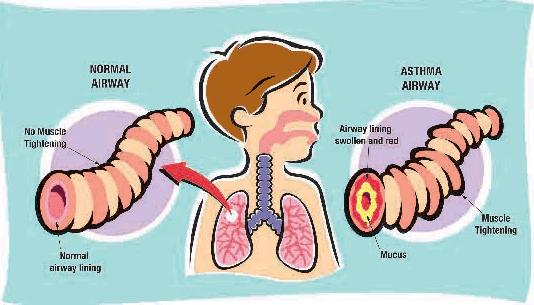
Asthma is an inflammatory disorder of the lungs that affects about 34 million Americans. the number of people with asthma has increased significantly over the past three decades, and by 2025 this number is expected to grow by more than 100 million.
Many people with asthma depend on the use of daily medications to control symptoms. these medications include inhaled steroids, which are not only hugely expensive but can also be associated with significant side effects, including respiratory infections and headaches. given cost and side effects of asthma medications, there is great incentive to identify other means to prevent and treat asthma.
A recent article in the journal Alternative Therapies looked at the cost and benefits of an integrative medicine approach to treating asthma.
This study was conducted at the Continuum Center for Health and Healing, an integrative medicine center at Beth Israel Medical Center in New York City; CCHH has had extensive experience in treating patients with asthma.
In the study, 154 people with mild to severe asthma were randomized into two groups. the first group was continued on its usual prescription meds for asthma.
The second group took its usual asthma meds and those in the group were also trained to incorporate the following integrative medicine practices into their daily routines:
• Attend two nutrition classes where they learned about foods that can trigger asthma and inflammation. They then engaged in an elimination diet for two to four weeks to identify their own particular dietary triggers, and eliminated those foods from their diet.
• Took daily fish oil capsules containing 860 mg of EPA and 580 mg of DHA.
• Took 1,000 mg of vitamin C daily.
• Took a standardized extract of hops, an anti- inflammatory herb.
• Attended two yoga classes and also learned how to practice the healing breath work of yoga known as pranayama; they were encouraged to do this on a daily basis.
• Attended an expressive journaling session where they wrote about the most traumatic stressful event of their lives. (Expressive writing like this has been shown in some studies to decrease symptoms of asthma.)
All participants were followed for six months. At the conclusion of the study, people in the treatment group were found to have significant improvements in quality-of-life measurements compared with the control group, and their overall physical and mental health were also improved.
Pulmonary function tests, however, did not show significant changes in either group over time. the researchers did not measure any changes in the use of prescription asthma medications between the two groups.
The interventions were well tolerated and produced no significant side effects, though several participants in the study group did report mild headache, nausea and fatigue, presumably from the supplements; none of them dropped out of the study, however.
One cautionary note here – hop extracts contain plant estrogens, so people with hormone-sensitive cancer should probably avoid them.
The cost of creating this group program, which was delivered in a community health center, was approximately $260 per participant, which is a bargain considering the cost of medications used to treat asthma, as well as the cost of clinic and emergency room visits for people with asthma.
The authors concluded that this “low-cost, low-risk lifestyle intervention can significantly improve both disease-specific and overall quality of life in adults with asthma over a six-month period.”
While this study had its methodological challenges, it was still an encouraging exploration of the power of lifestyle changes to improve symptoms and self-efficacy in people with a chronic illness like asthma.
Given the cost-effectiveness of these interventions, as well as their overall safety profile, it offers some promising adjunctive treatments to reduce symptoms and improve quality of life in people with asthma.
© Copyright the Sacramento Bee. All rights reserved.
Drs. Kay Judge and Maxine Barish-Wreden are medical directors of Sutter Downtown Integrative Medicine program. Have a question related to alternative medicine? E-mail adrenaline@sacbee.com.